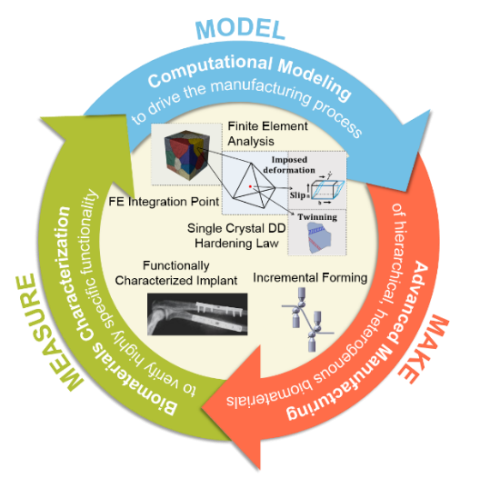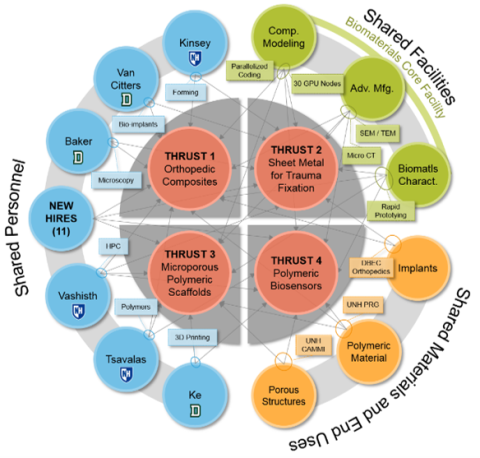
The goal of the New Hampshire Center for Multiscale Modeling and Manufacturing of Biomaterials (NH BioMade) is to advance the design and manufacture of biomaterials and develop the knowledge to predict and control their composition, structure, properties, and function. Biomaterials, such as those used in implants and tissue engineering, have stringent and potentially conflicting specifications (weight, strength, porosity, electrical conductivity, and complex geometries). NH BioMade research can be categorized into four major research thrusts:
Research Thrust 1: Composites for Orthopedic Bearings
Hypothesis: Highly localized shearing induced by Equal Channel Angular Extrusion promotes polymer chain interaction and entanglements, which in turn directly impacts particle fusion and structural development at the crystalline scale and achieves regional differences in porosity, conductivity, and modulus.
Team Lead for RT1: Doug Van Citters, Dartmouth College
Research Thrust 2: Sheet metal for trauma fixation
Hypothesis: Increased formability is exhibited by metallic alloys during non-linear deformation by locally controlling the dislocation behavior at the nanoscale, which creates a heterogeneous biomaterial in terms of strength and geometry.
Team Leads for RT2: Brad Kinsey, UNH and Ian Baker, Dartmouth College
Research Thrust 3: Scaffolds for tissue regeneration
Hypothesis: Well-defined, prestructured microparticles will enable 3D printing of heterogeneous physical and porous macrostructure through simultaneous self-assembly and top-down biomaterial fabrication.
Team Leads for RT3: John Tsavalas, UNH and Harish Vashisth, UNH
Research Thrust 4: Porous, conductive structures for biosensor applications
Hypothesis: Supramolecularly cross-linked polymers can serve as a 3D printing template to create hierarchically-organized functional nanomaterials, allowing cooperative assembly of conductive MOFs with the polymer network, which in turn enables precise bottom-up control over molecular and nanoscale porosity of electrode materials.
Team Lead for RT4: Katherine Mirica, Dartmouth College
View all NH BioMade Team Leads
Core Facilities
The core facilities created for this research are with respect to high-performance computing (including CPU and GPU cores), advanced manufacturing (in particular rapid prototyping), and biomaterials characterization, (including a micro-computed tomography scanner). Research-based seed funding opportunities will be available for emerging area pilot studies, industry-university collaborations, and utilizing the core facilities.
NH BioMade Technical Integration Points

